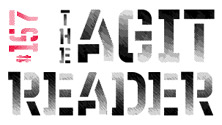
Some Easy Magic
Hozac
Though barely of driving age, Cleburne, Texas’ Fungi Girls (a trio of of teenage boys) have already shown a knack for melding together elements of rock & roll’s past and present into a sharp blend of frazzled melodies, guitar jangle, and youthful gung-ho. Following on the band’s debut from last year, Seafaring Pyramids, their sophomore effort, Some Easy Magic, more clearly defines where the band is coming from (and perhaps where they’re going), revealing their roots while also clearly transcending them.
Following a short instrumental prelude, “Sabana Breeze,” the record starts off in earnest with “Honey Face.” Here the girls, er, boys show their place in the Texan R&R lineage, effortlessly blending Crickets-like jump with the green fuzz of the 13th Floor Elevators. It is within these two ends of the spectrum that the Fungi Girls operate musically throughout the album, even when calling on other sources of inspiration. More often than not, it’s a bit of coming of age malaise that coats their lyrics. With the self-explanatory “Doldrums,” the band reduces its MO to jingle-jangle and the modern equivalent of “Now I Wanna Sniff Some Glue,” only without the inhalant. Here and on the subsequent “Hevrole,” 2011 could just as well be 1969, as the Fungis voice the perennial complaint of having nothin’ to do, much like Iggy Stooge once did. Fortunately, as Some Easy Magic clearly shows, these three kids have found their calling.
Stephen Slaybaugh
MP3: “Velvet Days”

Legendary Weapons
Entertainment One
Enter the 36 Chambers—any salt of the earth hip-hop student would openly and with ease tell you that this 1993 album was and is one of the most important urban records in history. This album introduced us to something that other acts had only hinted at being capable of conveying: thematic unity. This group of roughnecks from New York’s Staten Island were an insular firestorm that brought to light a plethora of personalities that were at once both familiar and wholly alien. All you had to mention was the words “Wu-Tang Clan” and you were guaranteed to be met with extreme responses both positive and negative. There was no middle ground when it came to the puzzlingly talented group from the slums of Shaolin.
Flash forward to the year 2011, and the release of the Wu-Tang’s latest compilation, Legendary Weapons. Over the last 18 years, the Wu-Tang Clan have released a high volume of content, from solo albums and studio albums to what we have here, which is a hodgepodge of music that merely features the most vital members of the group. Call it a Wu-Tang Karaoke. This record, like pretty much every compilation they’ve put out, puts a stain on the great work that has come out over the years under the Wu-Tang banner. With only fleeting appearances from the likes of Raekwon, Method Man, Ghostface Killah and RZA, this album is basically a loudly produced jumble. The majority of verses seem like toss-offs to the point that the usually bombastic Ghostface Killah seems tame and his lines regurgitated. The beats are generally washed out and much too clean, and the interludes, of which there are too many, are a continuous stream of kung-fu and gangster film quote reels.
This record leaves a yearning for the insanity of Ol’ Dirty Bastard, who, regardless of platform, was always good for at least one leftfield verse per song. Actually, it’s his presence that is missed the most. Since his passing in 2004, each Wu effort has been a certifiable exercise in trying too hard. This compilation, for instance, is trying to tap into the mystery that 36 Chambers unleashed, but instead works as a kind of American Idol for rappers. It feels as though RZA and company are attempting to shove unknowns and independent rappers down our throats instead of pointing their minds towards creating something long-lasting and legendary. Perhaps their announced 2012 album will ease all fears that the original Killer Bees have seen their best days. Perhaps there is still one more bullet in their collective chamber. The only hope to take from this mixtape is that maybe they’re saving their best for last.
Terrence Adams

Tripper
Sub Pop
Fruit Bats formed at a pivotal moment in folk-pop history, in 1997, just prior to the post-millennial folk resurgence ushered in by artists like the Shins, Iron and Wine, and Sufjan Stevens and subsequently devoured by the Garden State generation. Though the brainchild of Shins sideman Eric D. Johnson, Fruit Bats never quite caught the same wave of success as the others. Not surprisingly, a new decade dawned, Zach Braff faded away, and many of those once-invincible bands have scaled back. Happily, though, the Fruit Bats remained undeterred and are back with their fifth full-length, Tripper.
Tripper is the follow-up to 2009’s über-sunny The Ruminant Band and for better or worse (but mostly better), the album follows much the same script. Tripper often recalls the breezy, melody-driven pop songs of the early 1970s, the kind that now star in late-night infomercials and nostalgic compilation CDs. It is quite refreshing in its simplicity, the sort of easy listening that seems tailor-made for lazy summer days. There’s the endearing love song, “You’re Too Weird” which is straightforward and relatable in a Seals & Crofts kind of way. There’s also the Bee Gees-esque high-pitched harmonizing of “The Banishment Song,” the obligatory quirky ditty, “Dolly,” and the raw, thoughtful closer, “Wild Honey.” The standout, though, is “Tangie and Ray,” a beautiful, dreamy pop ballad. Maybe it’s just Johnson’s nasally falsetto, but this cut and others call to mind a folkier incarnation of the now-defunct Harlem Shakes.
Fruit Bats are a quintessential folk-pop band, through and through, and though Tripper may follow a certain well-worn formula, that’s not to say that formula isn’t followed beautifully. The indie folk explosion may have dwindled, but the Fruit Bats are a welcome remnant.
Jennifer Farmer
MP3: “Tangie and Ray”

Room(s)
Planet Mu
Over the past decade, Travis Stewart has made a name for himself in the electronic world—actually, several names. He’s known not only as a producer and as Machinedrum, but also for his other projects, Syndrone and Sepalcure, the latter with Praveen Sharma, who runs underground electronic music collective Percussion Lab. But even if none of these names mean anything to you, his latest release, Room(s), will be something you can’t forget.
As the album’s name implies, the tracks bring to mind cavernous clubs with rooms playing different types of music with the same overall theme. As for Stewart’s moniker, Machinedrum is more man than machine, or at least a harmonious marriage of the two, a rare blend of technological precision and manipulation with an undercurrent of soulfulness and, often, beauty. In fact, “Sacred Frequency,” with its heartlike pounding and video game sounds, is what I’d imagine the inner workings of an android (robot, not phone) might sound like if you put a stethoscope up to its chest while it sang. “Youniverse” is a tour of vocal manipulation from vocoder to autotune, while “Come1” starts off with a funky keyboard line and soul snippets before becoming awash in melody. The record ends with soaring, ethereal keyboards, as a digitally manipulated voice repeats the song’s title “Where Did We Go Wrong?” That’s a gutsy question to ask at the end of a record, but there’s not much to find fault with on this release.
Josie Rubio

Widowspeak
Captured Tracks
After several years of releases, the Captured Tracks label has become known for a certain aesthetic, a kind of lo-fi, subterranean post-goth hybrid in line with the sound of head honcho Mike Sniper’s own Blank Dogs project. As such, the echoey reverberations that came wafting out my speakers in sharp relief upon throwing on the self-titled debut from Widowspeak defied what little expectations I might have had for the record. As it turned out, that wasn’t a bad thing.
The Tacoma (by way of Brooklyn) trio specializes in a foggy mix of post-Velvets pop that immediately recalls Mazzy Star. The similarity is unavoidable as the two bands’ points of reference are no doubt similar, and singer Molly Hamilton could easily pass for Hope Sandoval if one didn’t know better. But while songs like “Harsh Realm” and “Limbs” bear a similarly sleepy coutnenance as those of Widowspeak’s predecessors (and don’t suffer for it), elsewhere, like on the leadoff “Puritan,” youthful vigor helps the band differentiate itself. Additionally, songs like “In the Pines” and “Fir Coat” speak to the group’s ties to the Pacific Northwest, their mix of coniferous imagery and melting tones distinct to the band. This is a record easy to love not only for being everything you didn’t think it would be, but also everything you hoped it might.
Stephen Slaybaugh
MP3: “Harsh Realm”
ALBUM REVIEWS
They Might Be Giants, Join Us
Tomorrow's Tulips, Eternally Teenage
Metronomy, The English Riviera
Thievery Corporation, Culture of Fear
Zomby, Dedication
Part Time, What Would You Say
The Fruit Tree Foundation, First Edition
Sons and Daughters, Mirror Mirror
Eleanor Friedberger, Last Summer
Memory Tapes, Player Piano
Brian Eno, Drums Between the Bells
Centro-matic, Candidate Waltz
Crystal Antlers, Two-Way Mirror
Handsome Furs, Sound Kapital
